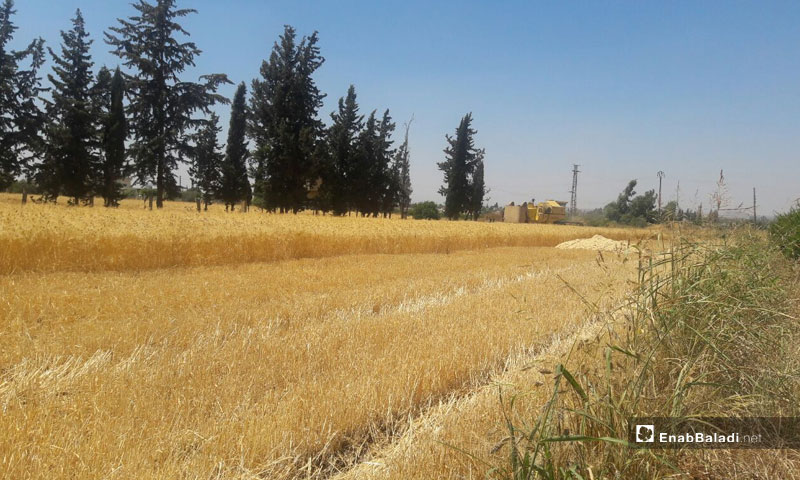



Enab Baladi – al-Qunaytirah
Nine years of war in Syria have taken their toll on agriculture in the southern region, leading to its deterioration due to the repeated targeting of farming lands and burning crops, before the Syrian regime regains control on Daraa province in mid-2018.
Farmers in southern Syria are currently facing many problems, the most prominent of which are the high prices of agricultural fertilizer, raw materials necessary for agriculture, and fuel. In addition to the intense security situation after the regime re-controlled the area, as well as the displacement of farmers from their lands due to war.
Moreover, the current spread of the novel coronavirus (COVID-19) pandemic has increased the burden placed on farmers for several reasons.
It became difficult for farmers to reach their lands like they used to before the coronavirus crisis due to partial curfews, closure of highways between cities and villages, as well as the closing of the Nassib border crossing, through which they used to export part of their agricultural produce to Jordan.
Ahmed al-Samadi, a farmer from al-Jaydour area northwestern Daraa countryside, said to Enab Baladi that before 2011, he used to plant tomatoes in his 50-dunum land (50,000 m2). He added that during the revolution years, he never cultivated it due to his town’s closeness to the clashes’ front lines.
Last year, al-Samadi re-planted only 25 dunums (25,000 m2) with tomatoes due to the cost of agriculture, pointing out the significant rise in the price of agricultural fertilizers, and the gradual hike of fuel prices since 2011.
The Syrian regime’s government announced at the beginning of last March, an increase in fertilizers’ prices by rates ranging from 41 to 100 percent depending on their type.
Meanwhile, the price of the ton of “superphosphate” fertilizer rose from 151,000 Syrian Pounds (SYP) to 304,000 SYP (117 to 236 USD), while the price of the “urea” fertilizer ton went up to 248,000 SYP (192 USD), instead of the old price of 175,000 SYP (136 USD).
The regime’s government also set the price for the “ammonium nitrate” fertilizer at 206,000 SYP (160 USD) instead of the previous price of 108,000 SYP (84 USD).
The Head of the Damascus and Rif Dimashq Agricultural Union, Mohammed Khallouf, said back then, that the effect of the fertilizers’ price increase decision would be “terrible” for farmers after raising production costs and their inability to keep up with the increase.
Khallouf added that the decision’s impact would worsen farmers’ conditions, especially after adding the cost of the new prices of fertilizer to other expenses, such as fuel, pesticides, labor costs, and other more, according to the local newspaper, “al-Watan.”
Despite the initiatives announced by the Ministry of Agriculture and Agrarian Reform of the regime’s government to support farmers, they have not actually helped to solve the problem of high agricultural production costs, which is reflected in the prices of locally grown vegetables and fruits in the markets.
Regarding some of the regime’s government’s initiatives to support farmers, Haitham al-Nuaimi from Ain al-Tineh town in the countryside of al-Qunaytirah said to Enab Baladi that, the Agricultural Union in collaboration with the Syrian Arab Red Crescent Organization (SARC), is distributing winter farming grants such as wheat seed, barley, fertilizer, and irrigation systems.
“However, farmers do not have access to these grants unless by the help of strong connections, or by standing in front of the doors of those responsible for distributing the grants, not to mention that the seeds or seedlings given are of poor quality,” said al-Nuaimi.
Al-Nuaimi added that although he did not stop planting his land throughout the revolution years, as his town was far from the bombardment areas, he suffered losses owing to the gradual rise in agricultural costs, including fertilizer, agricultural drugs, workers’ wages, and transportation expenses.
An agricultural engineer in al-Qunaytirah province spoke to Enab Baladi on the condition of anonymity concerning the factors necessary to improve farming.
He said the soil fertility is one of the most important factors of modern agriculture and is achieved when planting the land with more than one crop within the same year, to maintain the balance of minerals and essential elements for the crops planted in the soil.
Besides, crops need a proper irrigation system and favorable climatic conditions, as well as combating diseases that infect them such as armyworms, cotton whitefly, aphids, and the red spider.
Despite the improvement of the agricultural situation in Syria compared to that of previous years and the enhancement of wheat production for 2019 agricultural season, Syria has not yet been able to achieve the food security level that prevailed before the crisis, according to a report by the United Nations Food and Agriculture Organization (FAO), published in October 2019 on Syria.
FAO’s Regional Representative in Near East and North Africa, Abdessalam Ould Ahmed, said that about 6.5 million people are suffering from food insecurity in Syria, along with the displacement of thousands of farmers from their lands.
He added that farmers in Syria need more support to produce enough food for the Syrian people, such as effective irrigation systems, agricultural inputs of sustainable quality, access to information, and training, especially in areas such as Deir Ezzor, Daraa and al-Raqqa.
Ould Ahmed stressed that the Syrian regime’s government needs to amend agricultural policies and laws, help to promote the sustainable use of natural resources and guarantee that all farmers, especially the most vulnerable, have access to essential services and knowledge necessary to achieve sustainable development goals.
if you think the article contain wrong information or you have additional details Send Correction